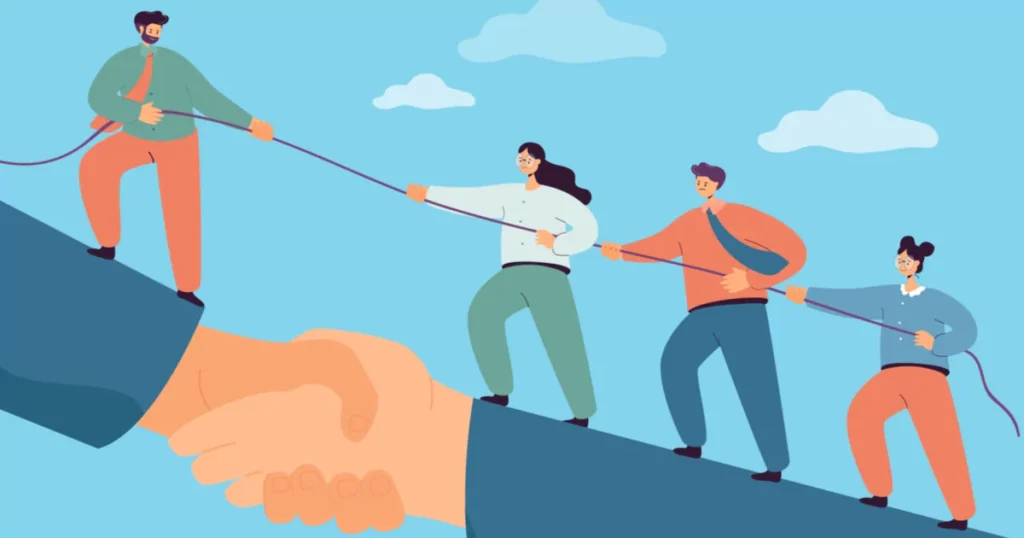Leadership is a skill that requires continuous development and practice, and one of the most engaging ways to cultivate these abilities is through leadership games. These activities are designed to enhance key leadership qualities such as communication, problem-solving, decision-making, teamwork, adaptability, and conflict resolution. Leadership games are often used in corporate training, team-building exercises, and educational workshops to provide a dynamic and enjoyable environment for learning and growth. In this article, we’ll explore various leadership games and the skills they help develop.
1. Why Leadership Games Matter
Leadership games are an effective way to cultivate essential leadership traits. They provide participants with hands-on experiences in problem-solving, team dynamics, and decision-making, all within a controlled and fun setting. These games also encourage self-reflection, as they often challenge individuals to think critically about their own leadership style, communication approach, and problem-solving methods.
The key benefits of leadership games include:
- Improved Communication: Games encourage participants to practice clear, effective, and assertive communication.
- Teamwork: Many games require collaboration, helping participants learn how to work effectively in a group.
- Creativity and Problem-Solving: Games often present scenarios where participants must think on their feet and come up with creative solutions.
- Trust and Relationship Building: Many leadership games involve trust exercises that help participants bond and establish deeper connections.
- Decision-Making: Games often present real-time challenges where quick and thoughtful decisions are essential.
2. Types of Leadership Games
A. Communication Games
Effective communication is essential for any leader. Leadership games that focus on communication help participants improve their ability to convey messages, listen actively, and ensure understanding.
Example: “Telephone Game”
In this game, participants sit in a circle. One person whispers a message into the ear of the person next to them. Each person whispers what they heard to the next, and the last person announces the message they received to the group. The goal is to highlight the importance of clear, concise communication, as the message usually changes as it moves from person to person. This game is a great reminder of the potential for miscommunication and the need for clarity in leadership.
Example: “Back-to-Back Drawing”
In this game, two participants sit back-to-back. One person has an image or diagram and must describe it verbally to the other person, who tries to draw the image based solely on the description. This game tests communication skills, especially the ability to provide clear, specific instructions while ensuring the other person fully understands.
B. Teamwork and Trust-Building Games
Trust and teamwork are central to effective leadership. Leadership games that focus on teamwork and trust help build stronger relationships and encourage collaboration within a group.
Example: “Trust Fall”
In the trust fall exercise, one participant stands with their back to the group and falls backward, relying on the group to catch them. This game builds trust, as it requires participants to put faith in one another. For leaders, this is a powerful metaphor for the trust required in leadership roles, where you must rely on your team to support and execute your vision.
Example: “Human Knot”
The human knot is a popular team-building game. Participants stand in a circle, reach across to grab two different people’s hands, and then try to untangle the knot without letting go of hands. This activity fosters teamwork, problem-solving, and communication, as participants must collaborate and work together to resolve the challenge.
C. Problem-Solving and Critical Thinking Games
Leadership often involves solving problems and making quick decisions. Games that focus on problem-solving can help participants develop these critical skills by providing challenges that require creative solutions.
Example: “The Egg Drop Challenge”
In the egg drop challenge, participants are given various materials like straws, tape, and paper, and are tasked with building a structure that will protect an egg from breaking when dropped from a height. This game encourages creative thinking, resourcefulness, and collaboration. It’s an excellent exercise for developing problem-solving skills in a leadership context, where leaders must often find innovative solutions with limited resources.
Example: “The Minefield”
In this game, an area is set up with various obstacles representing a “minefield.” Participants are blindfolded and must navigate through the minefield based on instructions from their teammates. This game emphasizes communication, trust, and decision-making, as participants must rely on one another to solve problems in real time.
D. Decision-Making and Leadership Dilemma Games
Leaders are constantly required to make decisions that have significant impacts on their team, organization, or projects. Decision-making games offer participants the opportunity to practice these skills in a dynamic environment.
Example: “Survival Scenario”
Participants are given a scenario where they must survive in a challenging situation, such as being stranded on a deserted island. The group is presented with a list of items, and they must decide, as a team, which items they will need most for survival. This game encourages discussion, negotiation, and consensus-building, helping leaders practice making decisions with limited information and under pressure.
Example: “The Leadership Dilemma”
In this game, participants are given a series of ethical or leadership challenges, such as dealing with a conflict of interest, managing a difficult employee, or making a tough decision. Participants must explain their choices and the reasoning behind their decisions. This game helps participants think critically about leadership dilemmas and understand the ethical implications of their decisions.
E. Adaptability and Change Management Games
Adaptability is another essential quality for a leader. Leaders must be able to manage change and guide their team through uncertain and shifting environments. Adaptability-focused games help participants practice flexibility and resilience.
Example: “The Changing Rules Game”
In this game, participants are given an initial set of rules for completing a task, but midway through the activity, the facilitator changes the rules. This game challenges participants to remain flexible and adapt to new circumstances quickly. Leaders who can navigate sudden changes are more effective in guiding their teams through uncertainty.
Example: “Obstacle Course”
Participants are required to navigate an obstacle course, but the rules or challenges change at different points in the activity. For example, they might need to work in pairs, solve a puzzle before moving forward, or take turns leading the group. This activity helps develop adaptability, problem-solving skills, and the ability to remain calm under pressure.
3. Conclusion
Leadership games are an excellent way to develop and reinforce key leadership skills. They create interactive environments where participants can practice communication, decision-making, problem-solving, teamwork, and adaptability, all of which are crucial for successful leadership. By participating in leadership games, individuals are given the opportunity to test their skills, learn from their mistakes, and improve in a fun, collaborative environment. Whether used in a corporate training setting, team-building event, or educational workshop, these games can help nurture the leaders of tomorrow, allowing them to develop the confidence and expertise needed to lead effectively in today’s dynamic world.



